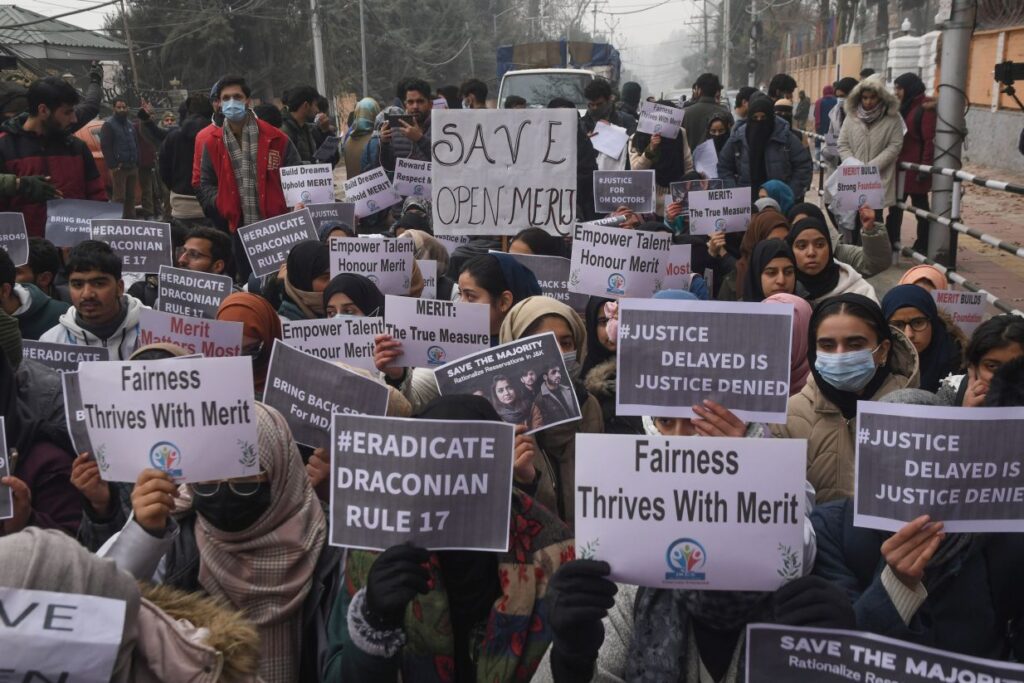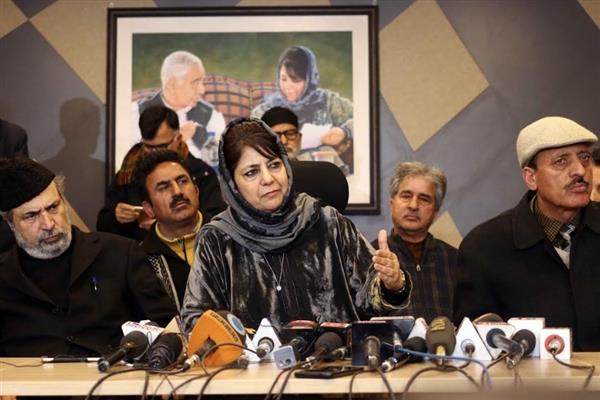J&K Open Merit Students Demand Urgent Action on Reservation Policy Review 2025
By: Javid Amin | Srinagar | 06 July 2025
A Growing Voice for Meritocracy in Jammu & Kashmir
A wave of frustration and concern has swept across Jammu and Kashmir’s student and job-seeking community. On July 6, 2025, hundreds of open merit students—candidates who apply without any reserved category advantage—called on the J&K government to immediately finalize the review of the region’s reservation policy, which they believe disproportionately affects their chances in public sector recruitment.
What began as a series of scattered protests and online appeals has now become an organized civic campaign. These students are demanding swift government action, transparency, and a fairer approach to how job quotas are distributed across the Union Territory.
The Root of the Concern: What Triggered the Protests?
The trigger is a report—the Reservation Policy Review Report—which was submitted by the Cabinet Sub-Committee after months of deliberation. It contains recommended changes to the existing reservation structure in J&K. However, this report has remained with the Law Department for legal vetting for several weeks now, with no public update, timeline, or official communication.
Open merit students argue that this bureaucratic delay is not just administrative—it is potentially career-altering. With various recruitment drives either underway or being planned, candidates fear that government hiring might proceed under outdated or unfair quota rules.
What Are Open Merit Students Demanding?
The students, many of whom are among the top scorers in competitive exams, have issued a concise but powerful list of demands:
- Immediate legal clearance of the Reservation Policy Review Report by the Law Department.
- A public statement from the government detailing the status of the policy review.
- A temporary suspension of all public recruitment processes until the policy is officially finalized and implemented.
- Transparency and accountability in the implementation of the reservation system to ensure it aligns with principles of fairness and justice.
Their argument is simple: Merit should not be sidelined.
“We are not against reservations, but against injustice in the name of it. The government must recognize our voice before it’s too late,” said Areeba Nazir, a postgraduate student from Anantnag.
Current Reservation Landscape in Jammu & Kashmir: A Snapshot
Currently, 60% of government job vacancies in J&K are reserved for different categories such as Scheduled Castes, Scheduled Tribes, Other Backward Classes, Economically Weaker Sections, and Pahari-speaking people. Only 40% of posts remain open to candidates applying under open merit.
This ratio, students argue, creates a lopsided system where deserving candidates with high academic and exam scores are routinely left out due to limited open slots, even though they might outperform others on merit alone.
In a highly competitive environment, where each job post attracts hundreds of applicants, even a marginal reduction in open merit seats could lead to career roadblocks for thousands.
The Human Toll: Mental Health, Hopelessness, and Lost Opportunities
Beyond the policy numbers lies a very human story. Many students report feeling demoralized and psychologically burdened. Years of preparation, coaching classes, and sleepless nights—invested in the hope of earning a government job—now seem uncertain.
“How do we stay motivated when even merit gets no reward?” asked Imran Ahmed, an aspirant who has been preparing for the JKPSC exams for four years.
Some candidates have already aged out of eligibility due to delays and shifting timelines in recruitments. Others are considering moving to other states or countries in search of better opportunities.
This is not just a matter of jobs—it’s a matter of dignity and dreams.
Political Silence: Where Are the Leaders?
Despite growing public pressure, most major political parties have remained notably silent on the matter. While some leaders have offered informal assurances, no party has made a clear, public commitment to addressing the issue.
This lack of response has not gone unnoticed.
“If our elected representatives won’t even acknowledge our pain, what hope is left for accountability?” said a student protester in Srinagar.
The silence is particularly glaring given the fact that youth employment and transparency in governance have been core promises in nearly every party’s manifesto.
A Legal and Constitutional Dilemma?
Legal experts suggest that reservation policies must balance affirmative action with merit-based inclusion. Article 16(4) of the Indian Constitution provides for reservations in public employment, but also emphasizes that such policies should not completely marginalize open competition.
If the open merit students’ claims of imbalance are true, it could potentially form the basis for legal review or judicial intervention, should the matter be escalated to courts.
How the Policy Review Could Change the Landscape
If the Law Department clears the report and its recommendations are implemented, several changes could reshape recruitment in J&K:
- A rebalancing of reserved and open merit categories, allowing more equitable access.
- A review of how the Economically Weaker Sections (EWS) quota is implemented.
- Possible adjustments in district-wise or category-wise weightage to ensure regional fairness.
- Enhanced focus on economic and performance-based indicators rather than solely caste or ethnic identifiers.
The students argue that any such change, even if moderate, would send a strong signal of reform and fairness.
Civil Society and Educators Speak Out
Several educators and civil society organizations have joined the call for reform.
“While reservations are vital for correcting historical wrongs, the system must also adapt to evolving realities,” said Prof. M. Iqbal, an educationist from Jammu University.
Youth groups, parents’ associations, and alumni networks are echoing the demands for a transparent, timely resolution that protects both social justice and academic merit.
What’s Next? The Clock is Ticking
With major recruitment notifications expected later this month and growing unrest among students, the pressure on the Omar Abdullah-led government is mounting.
Will the administration act decisively to publish the vetted review report and halt recruitments until clarity is provided? Or will the silence continue to fuel mistrust and discontent?
Sources indicate that the Chief Minister’s Secretariat has received dozens of letters and petitions over the last week alone. If no action is taken soon, mass protests and even legal action may follow.
A Wake-Up Call: Youth at the Crossroads
The issue of open merit representation is more than a procedural delay—it is a litmus test for how J&K’s governance system values its youth. In a region already grappling with high unemployment, fragile infrastructure, and post-conflict recovery, denying meritorious candidates a fair chance could prove deeply destabilizing.
Youths form the spine of any democracy. If they begin to lose faith in the system, it weakens the very foundation of civic trust.
Conclusion: Time for Transparent, Youth-Centric Governance
As Jammu & Kashmir prepares for a new chapter in governance, the government must not overlook the aspirations and anxieties of its brightest minds. Resolving the reservation policy impasse with clarity, fairness, and transparency is not only a legal or political necessity—it is a moral imperative.
For the thousands of open merit students still holding out hope, the time to act is now. Let merit breathe.


